
MBTAAnalysis: A look inside the MBTA
0 Comments
/
The MBTA shuttles over a million passengers a day around Greater…
 https://pioneerinstitute.org/wp-content/uploads/CloseupClock-1.jpg
739
1244
Mary Connaughton
https://pioneerinstitute.org/wp-content/uploads/logo_440x96.png
Mary Connaughton2017-02-20 12:34:192017-02-21 09:47:58The Clock is Ticking…….
https://pioneerinstitute.org/wp-content/uploads/CloseupClock-1.jpg
739
1244
Mary Connaughton
https://pioneerinstitute.org/wp-content/uploads/logo_440x96.png
Mary Connaughton2017-02-20 12:34:192017-02-21 09:47:58The Clock is Ticking…….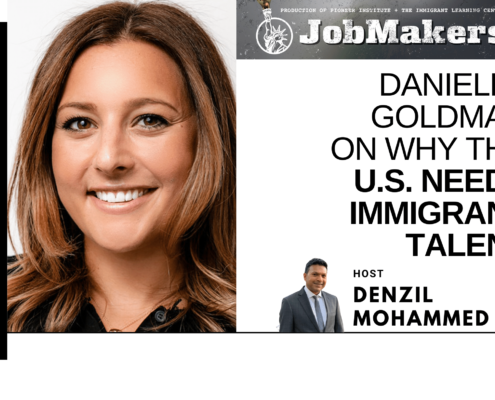
Danielle Goldman on Why the U.S. Needs Immigrant Talent
This week on JobMakers, Host Denzil Mohammed talks with Danielle Goldman, Co-Founder and Executive Director of the Open Avenues Foundation in Boston, about their work to help high-growth companies and start-ups retain the high-skilled, foreign-born talent they need through cap-exempt H-1B visas.

Study Suggests How to Advance Fairness, Predictability of “Payment in Lieu of Taxes” Programs Aimed at Nonprofits
A new white paper by Pioneer Institute calls for increased transparency over the basis for payment in lieu of taxes (“PILOT”) agreements between municipal governments and nonprofit organizations, while also encouraging nonprofits to publicize and expand the community benefits they provide.
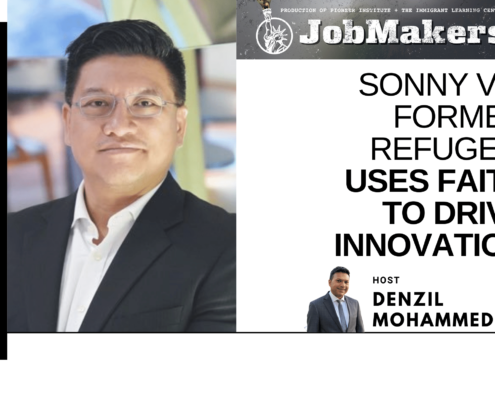
Sonny Vu, Former Refugee, Uses Faith to Drive Innovation
This week on JobMakers, Host Denzil Mohammed talks with Sonny Vu, serial entrepreneur and investor, about his work across continents to develop new technologies, processes and products that have, what he calls, “positive, planet-level impact.”

Public Statement on Implementation of the Charitable Giving Deduction
Despite being awash in cash, the state Legislature just overrode Gov. Charlie Baker’s veto of a provision to delay by yet another year a tax deduction for charitable donations. Rep. Mark Cusack, House chair of the Joint Committee on Revenue, said “it doesn’t mean no, just not now.” If not now, when?
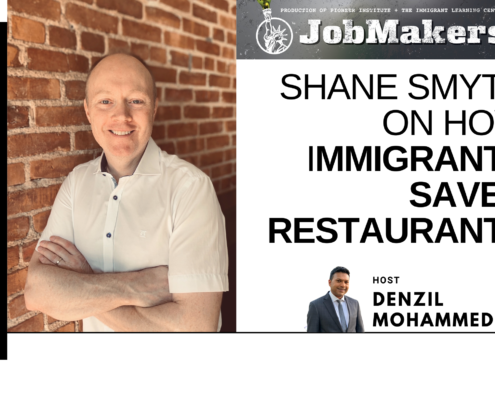
Shane Smyth on How Immigrants Saved Restaurants
This week on JobMakers, Host Denzil Mohammed talks with Shane Smyth, owner of Hugh O’Neill’s Irish Pub in Malden, and co-owner of five more restaurants in Newton and Boston, one of which he launched during the pandemic.

Understanding Property Tax, Property Value, and Tax Levy Trends in Massachusetts
According to Pioneer Institute’s MassAnalysis tool, single…
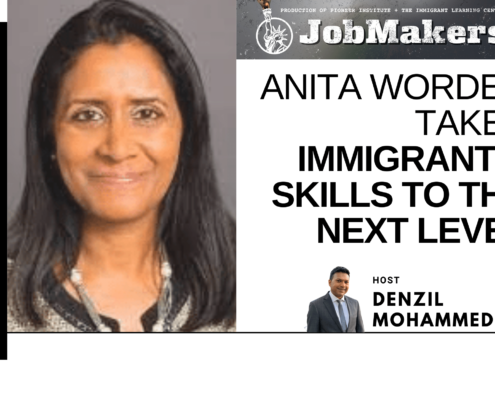
Anita Worden Takes Immigrants’ Skills to the Next Level
This week on JobMakers, Host Denzil Mohammed talks with Anita Worden, renewable energy business entrepreneur, about her work to improve representation of women in crucial economic sectors like technology, a place where they can innovate and have real impact.
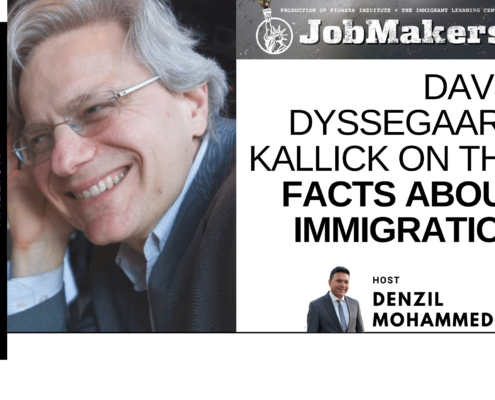
David Dyssegaard Kallick on the Facts about Immigration
This week on JobMakers, Host Denzil Mohammed talks with David Dyssegaard Kallick, Deputy Director of the nonprofit, nonpartisan think tank Fiscal Policy Institute and Assistant Visiting Professor at the Pratt Institute, on the impact of immigrants in local and national settings.

Ely Kaplansky Goes from Immigrant to Inc. 5000 Insurance Entrepreneur
This week on JobMakers, host Denzil Mohammed talks with Ely Kaplansky, President & CEO of Kaplansky Insurance. Since 1974, Ely has created hundreds of jobs in Massachusetts and beyond, with 85 employees in 15 offices across the state today, and he has grown his business during the pandemic, such that Kaplansky Insurance was named to Inc. magazine’s "5000 Fastest-Growing Private Companies in America" list. His success fulfilled the dreams of his parents when they moved from Israel to America in 1955, with just the clothes on their backs and an aunt to take them in. Their journey began in the concentration camps of Germany, and Ely’s story is all about the opportunity and freedom America offers.
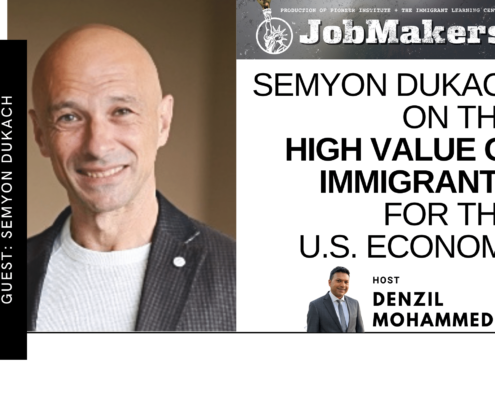
Semyon Dukach on the High Value of Immigrants for the U.S. Economy
This week on JobMakers, Host Denzil Mohammed talks with Russian-born entrepreneur Semyon Dukach about the high value of immigrants to the U.S. Dukach started a seed stage fund for immigrant tech founders, One Way Ventures, in response to the early restrictive moves of the Trump administration, particularly the Muslim ban.

Renters’ Unsung Heroes: Small Landlords Endure Without Income or Relief
Hubwonk host Joe Selvaggi talks with MassLandlords’ Doug Quattrochi about ways landlords faced the challenges of being caught between tenants unable to pay rent during COVID-19 shutdown and having little or no programmatic relief from state and federal agencies.
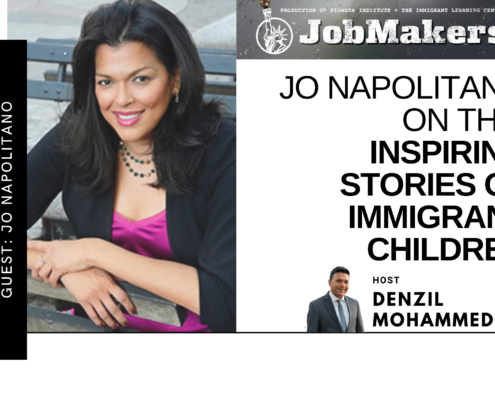
Jo Napolitano on the Inspiring Stories of Immigrant Children
This week on JobMakers, Host Denzil Mohammed talks with Jo Napolitano, journalist, former Spencer Fellow at Columbia University, and author of the new book, The School I Deserve: Six Young Refugees and Their Fight for Equality in America, about the enterprising spirit of immigrants and refugees across the nation and at the U.S.-Mexico border.

Umesh Bhuju Seeks a Fair Deal for Immigrants, Farmers & the Environment
This week on JobMakers, Host Denzil Mohammed talks with Umesh Bhuju, owner of Zumi’s Espresso in Ipswich, Massachusetts, about how a business model based on selling nothing but fair-trade products can thrive in a world driven by profit. He describes his early experiences in his homeland of Nepal, where he witnessed child labor, and how that has shaped his pursuit of the American dream.

Study Says Massachusetts Surtax Proposal Could Reduce Taxable Income in the State by Over $2 Billion
As voters now begin to weigh the potential impact of a ballot proposal to increase taxes on business owners, retirees and wealthier households, a new literature review by Pioneer Institute shows that many existing academic studies find that wealthy individuals are particularly sensitive to changes in tax policy. Other studies explicitly warn policymakers that behavioral responses to taxing the rich could erode the tax base and ultimately strain state budgets.
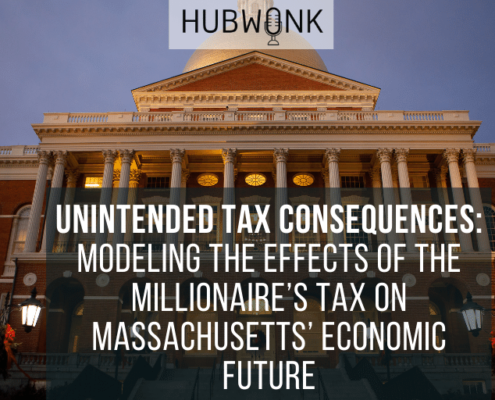
Unintended Tax Consequences: Modeling the Effects of the Millionaire’s Tax on Massachusetts’ Economic Future
Hubwonk host Joe Selvaggi talks with Beacon Hill Institute President Dr. David Tuerck about his recent analysis of the proposed 4% surtax on incomes over $1 million in Massachusetts, and his estimate of the number of individuals who will leave the state as a result. Tuerck, an economist, used STAMP modeling tools comparing the static projections offered by proponents of the so-called "Fair Share Amendment" with a model simulation that accounts for the unintended effects of the tax.

Dr. Babak Movassaghi on Winning in Football & Healthcare Innovation
This week on JobMakers, Host Denzil Mohammed talks with Dr. Babak Movassaghi, founder of InfiniteMD (acquired last summer by ConsumerMedical), which connects patients with top U.S. medical professionals through second-opinion video consultations, guiding patients to better care. When the world shut down due to COVID-19, Dr. Movassaghi's company was already prepared to serve patients via telehealth. In this episode, they discuss his fascinating pivot from physics and professional football in Germany, to healthcare and innovation here in the U.S., an extension of his ability to navigate multiple identities as an Iranian-German living the American Dream.

COVID-19 and Unemployment Rates in the Cape and Islands
The COVID-19 pandemic has had a large impact on unemployment…

This Is No Time for a Tax Increase
This is no time to threaten Massachusetts’ prospects for an immediate economic recovery and the long-term competitiveness of the Commonwealth’s businesses. As Massachusetts lawmakers prepare to vote on whether to send a proposed constitutional amendment that would impose a 4 percent surtax on residents who earn $1 million or more in a year to the statewide ballot in 2022, Pioneer Institute urges them to recognize that tax policy sizably impacts business and job location decisions and that jobs are more mobile than ever.

Jitka Borowick on Starting a Small Business during COVID
This week on JobMakers, Guest Host Jo Napolitano talks with Jitka Borowick, Founder & CEO of Cleangreen, a cleaning service committed to environmentally-friendly practices, and Nove Yoga, launched during COVID. Jitka grew up under communism in the Czech Republic. Determined to learn English, she made her way to the U.S., initially with plans to stay for only one year - but ended up making it her home. Jitka shares the difficulties of learning another language and culture, her pathway to entrepreneurship, her courageous decision to open a new business during a pandemic, and how her companies have successfully adapted to the challenges so many small businesses have encountered over the past year.

Study Finds Deep Flaws in Advocates’ Claims that the Massachusetts Tax Code is Regressive
Proponents of a state constitutional amendment to add a 4 percent surtax on all households with annual income above $1 million frequently cite 2015 data from the Institute on Taxation and Economic Policy, which argues that the Massachusetts tax code is regressive, but a new study published by Pioneer Institute debunks many of the underlying assumptions used in ITEP’s 2015 report.
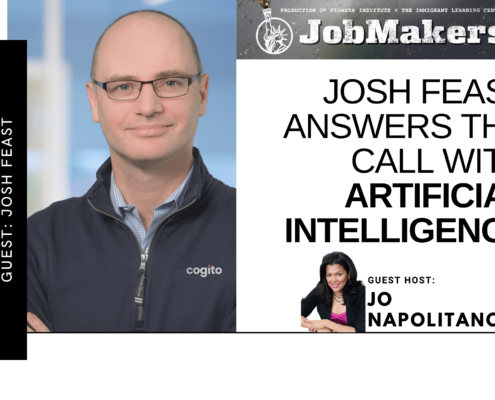
Josh Feast Answers the Call with AI
This week on JobMakers, Guest Host Jo Napolitano talks with Josh Feast, the CEO and Co-Founder of Cogito, a Boston-based software company that deploys Artificial Intelligence (AI) to help employers in a wide variety of industries improve their customer service call centers. They discuss the many applications of Artificial Intelligence, how it helps provide emotional intelligence to augment management practices at large organizations, and how to address some of the concerns about privacy and bias that have been raised around its use.

Mahmud Jafri Builds on a Pakistani Legacy in America
This week on JobMakers, Host Denzil Mohammed talks with Mahmud Jafri, who built on a legacy started by his grandfather and began importing hand-knitted rugs from his native Pakistan, creating opportunities especially for women who traditionally couldn’t work outside the home. Today, he has three Dover Rug & Home stores across Massachusetts, including the Back Bay.

Pipelines Are Infrastructure: Colonial Incident Reveals Dark Side of Cyber Vulnerability
This week on Hubwonk, Host Joe Selvaggi talks with cyber security expert Dr. Brandon Valeriano about the Colonial Pipeline shutdown and our national exposure to cyberattack on vital infrastructure.
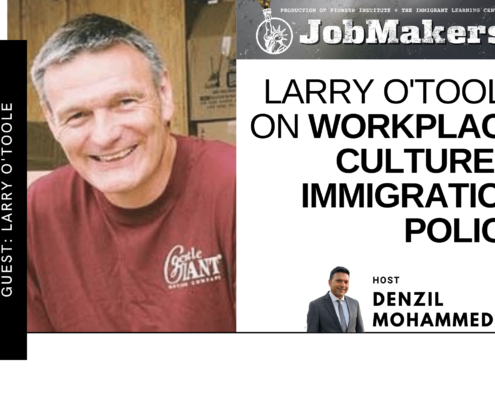
Larry O’Toole on Workplace Culture & Immigration Policy
On this week's episode of JobMakers, host Denzil Mohammed talks to Larry O’Toole, founder of the multi-state Gentle Giant Moving Company that started in 1980 right here in the Boston area. They discuss Mr. O'Toole's journey at a young age from Ireland to Brookline, Mass., the challenges of being uprooted, and the ability to thrive despite barriers such as skills gaps, that many immigrants face.
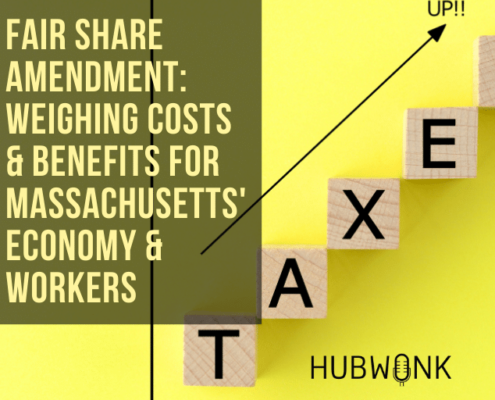
Fair Share Amendment: Weighing Costs & Benefits for Massachusetts’ Economy & Workers
Hubwonk host Joe Selvaggi talks with Pioneer Institute’s Executive Director Jim Stergios about HB86, the so-called Fair Share Amendment, to tax Massachusetts household income above $1 million. They discuss its promises, its costs, and the effects of similar legislation in other states.

Amar Sawhney on Sikhs, STEM & COVID
On this week's episode of JobMakers, host Denzil Mohammed talks to Dr. Amar Sawhney about his journey from India to Boston, and how he is using his chemical engineering background to save lives through remarkable local therapy innovations. To date, he has founded eight companies accounting for 4,000 jobs and more than $2 billion in revenue.

Study Says Interstate Tax Competition, Relocation Subsidies Exacerbate Telecommuting Trends
A spate of new incentive and subsidy programs seeking to lure talented workers and innovative businesses away from their home states could constitute an additional challenge to Massachusetts’ economic and fiscal recovery from COVID-19, according to a new study published by Pioneer Institute.
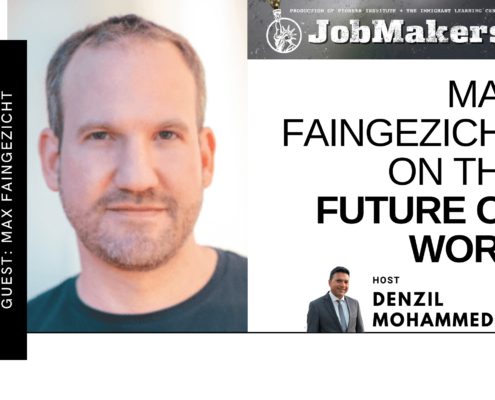
Max Faingezicht on the Skills Gap & the Future of Work
This week on JobMakers, host Denzil Mohammed talks with Max Faingezicht, an immigrant who founded ThriveHive, a marketing software company for small businesses, and Telescoped, which uses remote software engineering to connect Latin American engineers with U.S. companies in need of their skills. The entrepreneurial ecosystem of Boston and Cambridge have allowed Max to achieve dreams he didn’t even know he had when he arrived. In this episode, he shares his fascinating immigration story, as well as his ideas on where workers go next.
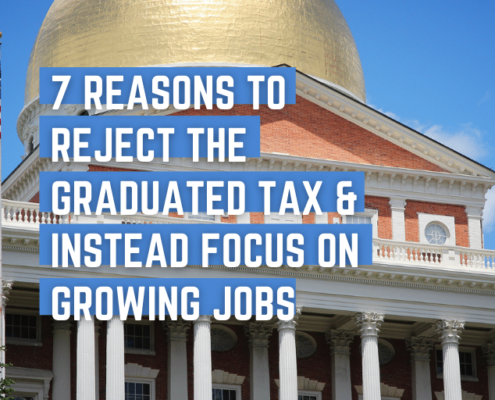
7 Reasons to Reject the Graduated Tax and Instead Focus on Growing Jobs
Pioneer Institute's Statement before the Joint Committee on Revenue In Opposition to: HB 86 (Pages 1-4), a legislative amendment to the Constitution to provide resources for education and transportation through an additional tax on incomes in excess of one million dollars.

Study Warns Massachusetts Tax Proposal Would Deter Investment, Stifling the “Innovation Economy”
A state constitutional amendment promoted by the Massachusetts Teachers Association and the Service Employees International Union adding a 4 percent surtax to all annual income above $1 million could devastate innovative startups dependent on Boston’s financial services industry for funding, ultimately hampering the region’s recovery from the COVID-19 economic recession, according to a new study published by Pioneer Institute.
